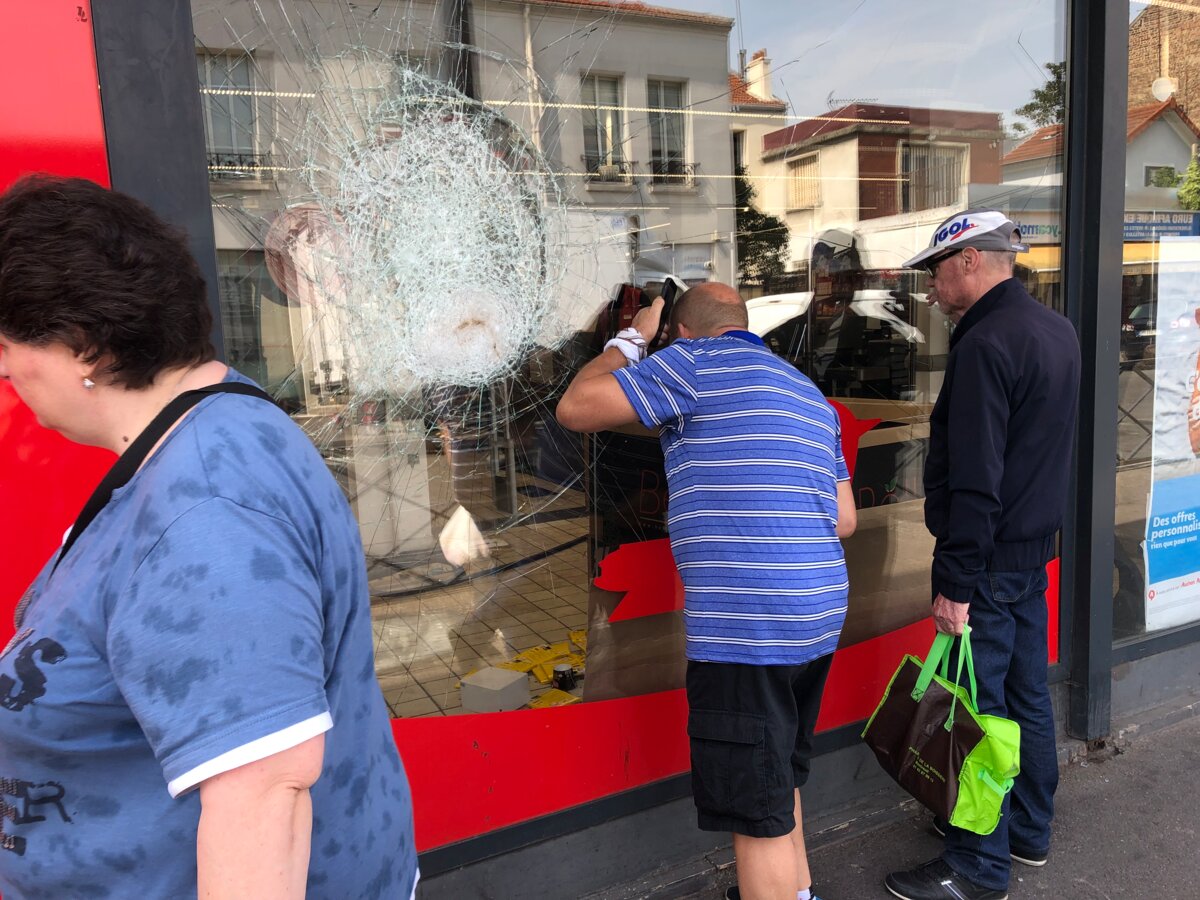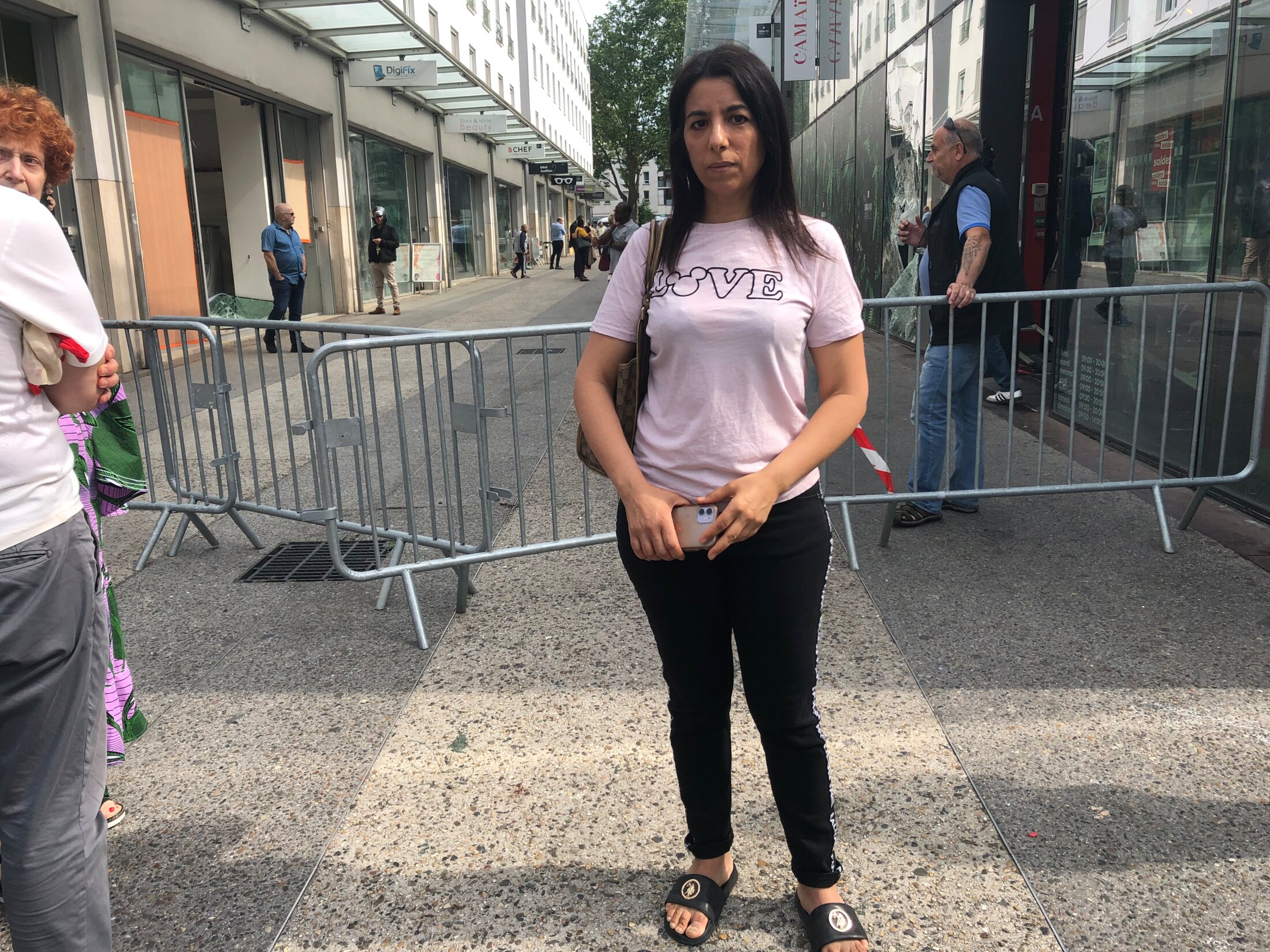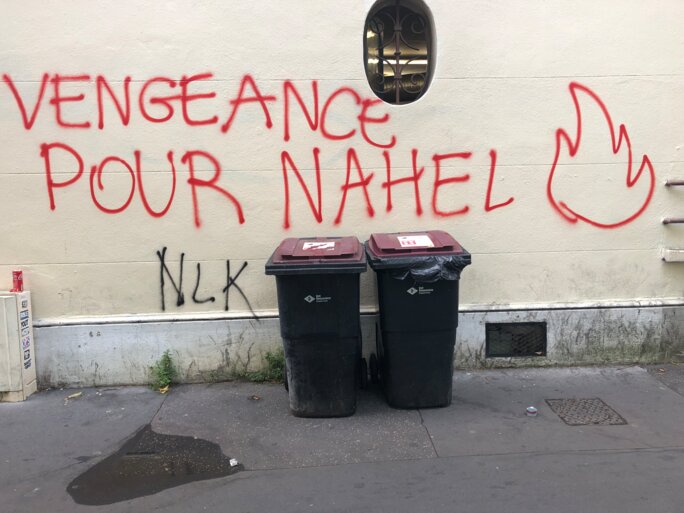Many have simply come to see and stare at the damage. Residents of the town of Montreuil in the eastern suburbs of Paris are heading down one of the concrete walkways in the shopping centre opposite the town hall; some stop and squint through shattered shop windows, their hands shielding their eyes so they can see the full scale of the damage inside. Businesses that have been affected include perfume shops, bakeries, fast-food outlets, a chemist, mobile phone stores and a home décor shop; indeed, few have been spared. The town hall was also targeted by firework mortars and set alight at one point.
“What gets me is the curiosity. People come, they film, they take photos, like they were tourists,” says Didier, father-in-law of the owner of the Yves Rocher perfume store whose shopfront was badly damaged. His daughter-in-law, who has run it for six years, is in shock. A few minutes later she loses her temper with an official in a suit at the doorway who has been hastily dispatched by the owners of the shopping centre to check on the extent of the damage. Camille, one of the two sales staff at the perfume and cosmetics store, describes the day that lies ahead: clearing up and making an inventory of the creams, perfumes and soaps that have been stolen. “I understand the rebellion that's taken place since Nahel's death, but not the actions,” she says. “How are we supposed to work?”

Enlargement : Illustration 1

Clara and Marianna have come to the town centre this morning, close to Montreuil's town hall where most of the disturbances were focussed the night before, to “see” and “understand” for themselves what happened. The two young women say they were “distraught” over Nahel's death at a police roadblock in Nanterre. “An execution,” they call it. “We're not forgetting about the shopkeepers, the public workers who must clean up afterwards, we discuss it among ourselves because it's not simple, but we don't condemn what happened last night. We don't want the violence making people forget what started it all,” says Clara, while her friend indicates a nearby wall with the word “vengeance” written on it.
Together with Alexis, who had just joined them, they are planning to go to the 8pm gathering in front of the town hall being organised here, as in many towns across France, as a protest against police violence. “The reason we're here this morning is also to show the young people who have been on the streets for three nights that they're not alone in this fight, to not walk away from them,” says Alexis.
In the La Boissière district in Haut-Montreuil Safia was “frightened, very frightened” during the night. On her mobile phone she scrolls through images of the mortar fireworks that went off and the major fires that burned in her street for hours. She has come to the town centre with her daughter to drop off some electrical equipment but the store is closed, with the shutters firmly down over the shattered glass.
Sofia, 48, who teaches adults and who has two children, says she has “mixed feelings” over the recent unrest. “I don't agree with the way of doing it but even at my age I feel the sense of injustice that the young people experience here,” she says. “They're not listened to, they're left to themselves. How should they go about it? If they demonstrate they get charged at! These young people here are expressing the despair that my generation weren't able to express, and because their situation is even worse than ours.”

Enlargement : Illustration 2

French and of North African origin, Safia has no difficulty in highlighting what has provoked her anger and that of the young and less young people around her. “If you don't experience it you can't understand it: we're not considered to be citizens as others in this country are, despite all our efforts. Of course young Nahel was killed because he was Maghrebi [editor's note, referring to the Maghreb region of North Africa], no one doubts that here!” she says. “I might do all that I can, celebrating Eid and celebrating Christmas, working, bringing up my children, being as open-minded as possible, it will never be enough. France is incapable of imagining a dual identity, joining them together, and we've had enough of it.”
She also talks about inflation which has its biggest impact on poor and middle income families, with the price of eggs and milk having doubled. “I saw them last night, very young people coming out with bags full to the brim with food, it was quite striking,” she says. In the neighbourhood where Safia lives several residents describe similar scenes that they witnessed from their balconies, with youths pushing trolleys as they left the Auchan supermarket. This store was massively targeted, far more than the town centre shops; so, too, was the Aldi discount supermarket near Romainville. “It was as if they were doing the shopping for their mum!” says one resident. The supermarket security guard confirms: “They took the lot, the store's empty.”
The anger is near-unanimous among those running smaller shops on Boulevard de la Boissière, which also bore the brunt of the destruction. The bosses of an opticians discovered in the morning that a wall in their shop had been ripped down, as well as the shopfront being destroyed, and they were furious. “They wanted to break everything, they're hooligans, they don't give a damn about this poor kid!” says the owner. She is just hoping that her insurance will cover it. “If not, the state will have to cough up, there's no way I'm going to pay for their stupid behaviour.”
Mohammed, who has always lived in Montreuil and who has just done a tour of the place on his e-scooter, managed to stop the IT shop next door being looted the night before, but nothing more. “I don't understand. In 2005, after Clichy-sous-Bois [editor's note, there were widespread riots in France after the deaths of two youths in that Paris suburb] they didn't target shops like this. You have to target the symbols of the state, otherwise what sense does it make?” Djaz, a member of the IT store's staff and local resident, adds: “The worst thing is that the police did nothing: we saw no one between 11pm when the first van was burnt and 6am. We were completely abandoned.”

Enlargement : Illustration 3

Do people understand it? “It's like the death of this young man in Nanterre, is there anything to understand?” asks the boss of the Bar des Sports café a few metres away, situated on one of the main roads that crosses the Seine-Saint-Denis département or county where Montreuril is located. “But it overflows onto us,” says Rachid, a greengrocer from next door, coffee in hand. It was a long night for him as he kept watch until 4am. “If Nahel was about racism then it needs saying, if it was criminal, then we need to know, but you can't mix it all up. The Republic is for everyone, the police and the young,” he says.
François and Nathalie have just come back from the accident and emergency department, and are pushing a pram with a tiny baby inside. “The fourth generation of Montreuil residents,” they joke. Nathalie's father was born here, and the couple came to live here two years ago in one of those neighbourhoods in Haut-Montreuil where, says Nathalie, “middle managers like us” live alongside very poor families who are often housed in very dilapidated buildings.
This town that François describes as “incredible, multicultural, where everyone is pulling in the same direction” nonetheless experienced a night of “heedless, blind violence” which could be heard under their windows. “I was very surprised,” admits François. “Because the town hall really does a lot of things, it looks after the most vulnerable. There are lots of festive events before the summer, you could be forgiven for thinking that everyone was on the same wavelength....” Nathalie concedes: “It's a kind of reality check.”
-------------------------------------------------------------------------------
- The original French version of this article can be found here.
English version by Michael Streeter


